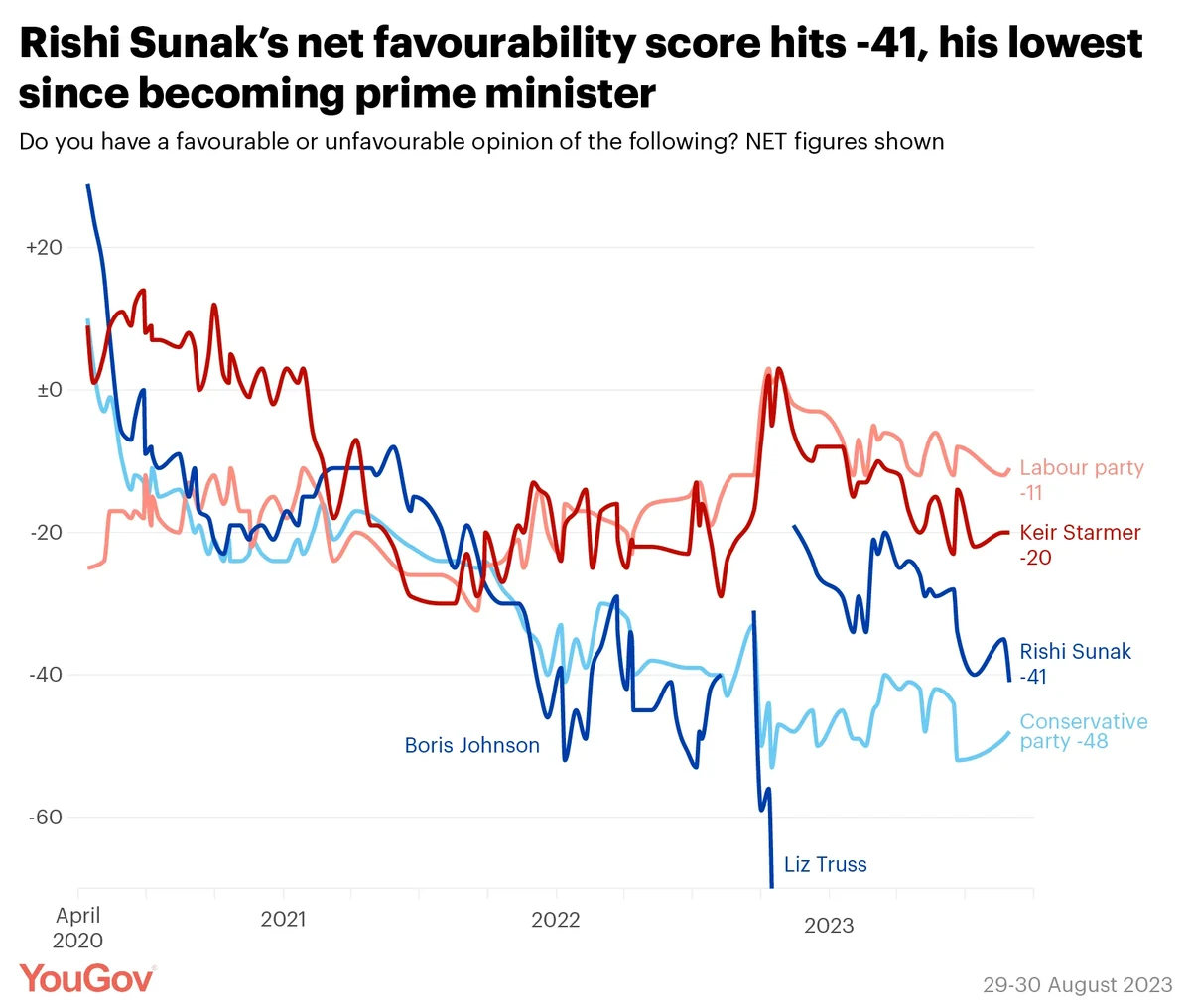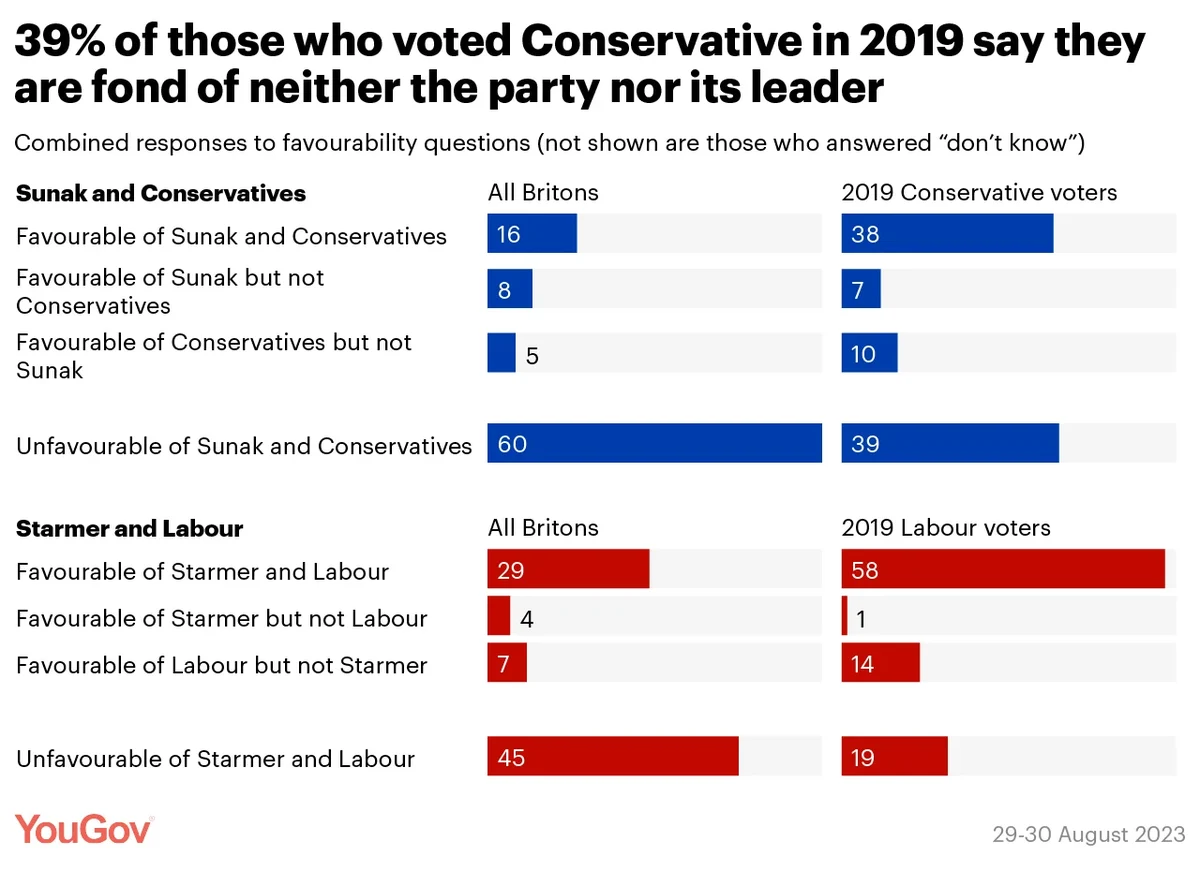The Tories trail Labour across key groups
YouGov polling on 29-30 August found that 67% of Britons held an unfavourable opinion of Rishi Sunak, his lowest to date, and up four points from our poll a week prior. With only 26% of people having a favourable view of him, this gives him a net favourability score of -41, again, his lowest so far.
Sunak is marginally less unpopular than his party, with 70% of Britons having a negative view of the Conservatives and 22% a positive one.

Overall, 60% of Britons have a favourable view of neither Sunak nor his party. Only 16% are positive about both, while 8% like Sunak but not the Tories, and 5% like the Tories but not Sunak.
Among 2019 Conservative voters, fully 39% say they don’t like either the party or its leader – the same number as like both.
Keir Starmer’s favourability score remains stable, with 34% holding a positive view of the Labour leader and 54% a negative one, both a point off the previous week’s findings.
Starmer is slightly more unpopular than his party, of whom 40% of Britons have a favourable opinion and 51% a negative one.
Approaching half of Britons like neither Starmer or his party (45%). Three in ten (29%) say they like both, while 4% like Starmer but not Labour and 7% like Labour but not Starmer.

The majority of 2019 Labour voters like both the party and its leader (58%), compared to only 19% who dislike both.
We also took the opportunity in this survey to compare favourability ratings against various demographic factors and attitudes.
With the Conservatives seemingly trying to provoke a culture war between drivers and non-drivers, the results show that the party and its leader are less popular than their rivals among both groups. Among those who drive at least once a week, Rishi Sunak has a net favourability rating of -36 and his party stands at -44. This compares to -23 for Labour and -27 for Starmer.
Among non-drivers, this gap is starker still: while Labour rates at -10 and Starmer at -28, the prime minister receives just -51 and the Conservatives -54.
With mortgage rates spiralling, the Conservatives again prove very unpopular with homeowners, at -46 for the party and -36 for the leader. Labour and Starmer score -18 and -21 respectively.
The Conservatives are also less popular across all household income brackets. Looking across various cost of living situations, the Conservatives only prove more popular than their Labour counterparts among those who say their income is keeping pace with prices in shops, and those who have not had to make spending cuts and don’t foresee having to do so. They are, nevertheless, still net unpopular among both groups.
Unsurprisingly, the Tories are particularly unpopular among those whose financial situation has deteriorated in the last 12 months (-56 for Sunak, -65 for his party). Labour, by contrast, stand at -3 among this group, and Starmer at -3.
These ratings are similar for those who expect their household finances to get worse in the next 12 months. However, the Conservatives are still significantly less popular than Labour among those who expect their finances to improve: -32 for the Tory party compared to +8 for Labour. Starmer scores -4 here, compared to Sunak’s -19.
On immigration, one of the public’s top issues currently, the Tories are unpopular with those of all immigration stances – whether they think immigration has been too high, too low, or about right. Among those holding one of the latter two views, they are far behind Labour, while among those who say immigration levels have been too high they are only somewhat ahead: the Conservatives and their leader scoring -33 and -32, while Labour are on -38 and Starmer -41.
Photo: Getty










